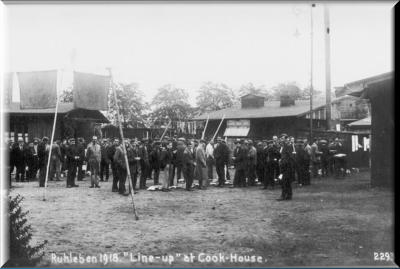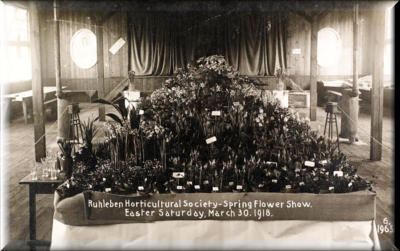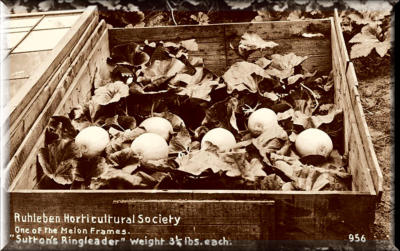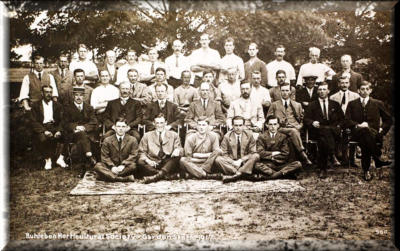


© Palatine Lodge - 1893 - 2023 - In se ipso totus teres -
That was at the beginning of a cold, wet winter and for each of their three daily meals, the men had to
wade, for about a quarter of a mile, across the muddy stable yard to collect a meal that was wholly
inadequate which they then had to bring back to their barracks to eat. There follows a few selected
extracts from the diary of a prisoner called Burton, taken from the early part of 1915 which show that
things hadn't really improved after the first few months:
January 8th. Raining and blowing hard. Grounds in horrible condition.
January 9th. White bread stopped at canteen
January 10th. Small rolls doubled in price. Evidently getting scarce.
January 16th. Weather still rotten.
January 29th. Cabbage soup again. Third time in seven days.
February 1st. Freezing. Loaf of bread now has to last us three days. Price at canteen doubled. Received
news of arrival of son and heir.
February 2nd. New departure in the feeding. Each man receiving a piece of meat.
February 3rd. Lots of people on the sick list, supposed to be a kind of poisoning caused by the meat, being
no longer used to it. Skilly for tea again.' ( Incidentally, what had actually happened is that a shipment of meat had been condemned but, so it wouldn't be wasted, it was sent to Ruhleben.
It caused a three-day epidemic of dysentery.) - back to the diary…
February 21st All bread stopped at canteen.
February 28th. Snow again. Started today on new bread system, giving out one third of a loaf a day per
man, pretty rotten stuff at that. Getting pretty hungry. Skilly was mentioned in Burton's diary. It was a thin
gruel made from oat meal and, as it provided virtually no nourishment, was very unpopular with the men.
As early as the previous November, what became known as the 'skilly riot' took place when many of the
merchant seamen spontaneously refused to eat the gruel. It wasn't the only complaint and, a few months
later, the contractor providing the food was removed. Nevertheless, there were to be more food ration
demonstrations in 1915. There was also a bit of private enterprise. As we have heard, many of the
prisoners weren't completely without money and within a month of the camp becoming occupied, a
sandwich business had opened which was so popular that, at the end of the first day's trading a dividend
of 20% was given out. But things did begin to improve. Soon after those extracts from Burton's diary were
written, various committees in England had become aware of the plight of the Ruhleben prisoners and the families of individual prisoners also wanted to send relief parcels to Germany or,
at least, pay for them to be sent. Advertisements began to appear in the press which urged people to
donate and recommended various products. What were known as comfort organisations were set up to
help prisoners from their particular area.
There were also advertisements in newspapers offering:
'FOOD FOR PRISONERS OF WAR, if your soldier friend or relative is a prisoner of war in Germany, he
will appreciate A PARCEL OF FOOD FROM HOME. Prices range from five shillings to £1' Another
advertisement urged people to 'render a national service by opening your purses and send parcels of
comfort to the brave men who are suffering dire privation in the hands of the enemy' Food parcels,
medical supplies and clothing began to arrive at the camp. Back home in England, the Batley news had
taken a considerable interest in the affairs of Ruhleben because of close ties within the textile industry and
regularly printed news from the camp. The editor organised a meeting of the Ruhleben wives and mothers
and it was agreed that goods would be collected and sent, via the Red Cross. Not just food but items like
soap, toothpaste and, of course, cigarettes. This was proposed by Mrs J C Ferguson and seconded by Mrs H Leach.
By the end of the War, over 2.5 million parcels had been organised, packaged, wrapped and
dispatched to the various prisoner of war camps abroad. The large number of parcels that were arriving at
Ruhleben every day and how their administration was organised, is to the credit of all concerned that,
apparently, the vast majority arrived intact and in good condition. Inevitably, those with the necessary
skills and knowledge, started to grow fruit and vegetables and, in fact, flowers, some to hide the barbed
wire, some for decoration (the sailors in Barrack 8, apparently, were very proud of their rose garden) and
some of the internees grew chrysanthemums and dahlias which were sent back to England and sold to
raise funds for their families. Then, in 1916, after the land in the centre of the racecourse was made
available, a letter arrived at the offices of the Royal Horticultural Society in London. It announced the
creation of the Ruhleben Horticultural Society and asked for affiliation with the RHS and added 'we are
unable to remit the usual fee but trust this will be no hindrance to our enjoying the privileges of affiliation'
below which the RHS Secretary has written, in red 'absolutely not'.
The letter went on to say 'As the work we have in view is a large one, we should be grateful for gifts of bulbs and seeds'. It wasn't easy to introduce horticulture on a larger scale
and many prisoners were employed as gardeners. Pests were a big problem and the soil was dry loose sand which quickly turned into mud. As good quality manure was difficult to source,
old tea leaves were used instead. The gardeners worked round all these issues. They built cold frames with some success and even a heated greenhouse which extended their growing
season. Then, in the Autumn of 1917, a plague of locusts descended on the camp and devoured every green thing in sight.
But, by the end of the war, the camp was more or less self-sufficient in fruit and vegetables and, in fact, the quality of the diet inside the fence was much better than that outside. There
was almost no food left in Germany. I haven't yet mentioned drinks. Tea, coffee and cocoa were available, more especially after the food parcels started to arrive. There were, occasionally,
limited amounts of fresh milk and condensed milk was also included in many of the parcels. Alcohol was strictly off limits apart from what was described as imitation beer. Wine was sold
at profiteering prices by one of the German officers and, inevitably, bootlegging and black-market activity emerged and more than one prisoner enjoyed a spell of solitary confinement
after being found drunk.

Food Parcels




















